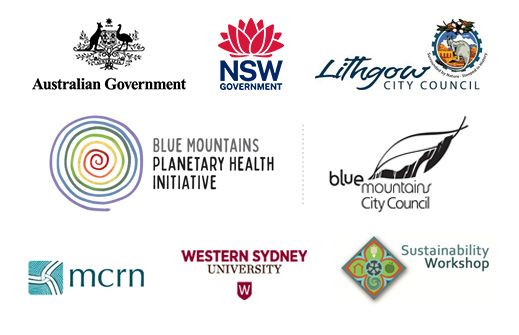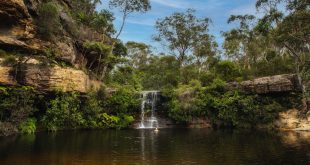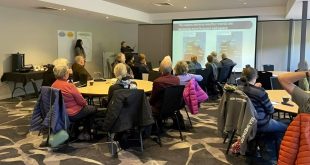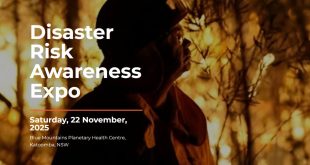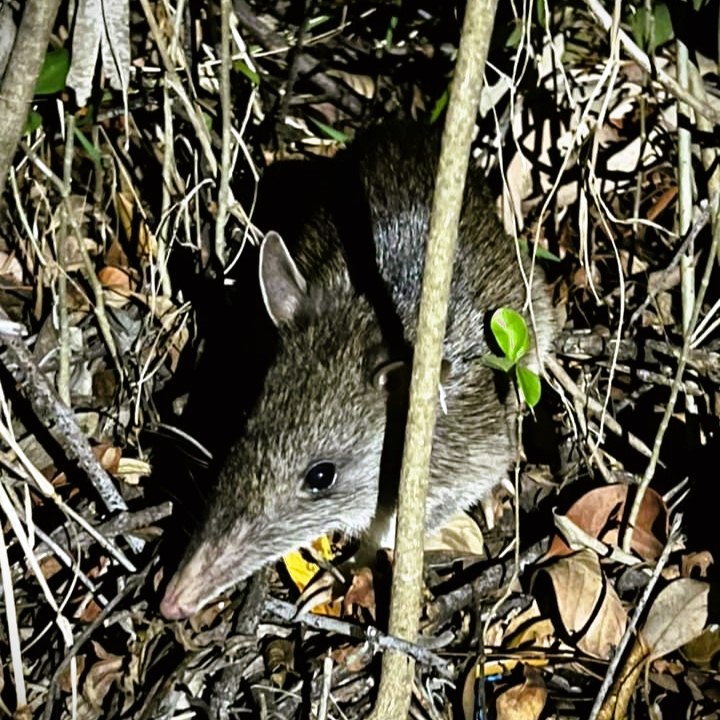
A Long-nosed Bandicoot enjoying some time in a local garden. Photo courtesy Fiona Peters, Winmalee resident
Story by Gabiann Marin
The Long-nosed Bandicoot is back in Lower and Mid Mountains neighbourhoods, and many residents are rejoicing at having neighbourly visits from these furry friends. By being bandicoot aware and making our surroundings even more bandicoot friendly, we can ensure both marsupial and human neighbours enjoy their time together and cohabit in a way that is happy, safe, and secure.
As we roll towards summer many neighbourhoods in Winmalee, Springwood, Sun Valley and Valley Heights are noticing disturbances in their gardens.
Key Points:
- After bushfires, heatwaves, drought and floods, bandicoots are bouncing back in the Blue Mountains
- Bandicoots aren’t just cute, they bring benefits to your garden too
- There are simple things you can do to encourage these visitors, and to cohabit well together
Mysterious visitors leaving small holes in garden beds or glimpses of shadowy shapes galloping across the lawn. Never fear, these telltale signs are a great indication that our native bandicoot populations, so badly decimated by recent and historical fire and disaster events, are bouncing back.
Many in the area are delighted that these furry creatures are choosing to come and pay them a call, catching nocturnal video footage of the marsupials as they scurry across driveways and hunt for worms and insects.
“We’ve got bandicoots in our yard in Winmalee, as do most of our neighbours. We’ve also had brush turkeys, and this morning a quail! I’ve lived on this main road block for over 20 years and have had a quoll in my yard, but never seen anywhere near this many new species.” – Bec Southwell, Winmalee
Bandicoots used to be plentiful across our nation with over 21 distinct species identified, although according to Bush Heritage Australia almost half of those species are now extinct, with many others endangered or threatened. Thankfully the long-nosed bandicoot, which is most common in our area, is not on the endangered list as a species.
However, they can find themselves greatly reduced in areas where there is a significant loss of habitat or introduced predators, so keeping our local inhabitants healthy and happy is critically important for the good of the species as a whole.
In the past month multiple sightings of the animal and their digs or ‘snout pokes’ have indicated a rise in the bandicoot population of the Lower and Mid Mountains. Across the Lower Mountains the response to the increase of bandicoot numbers has been fairly positive, with most people welcoming them into their property. Some homeowners are a little worried that the bandicoots may get into prized flower beds or disturb veggie gardens, and there is concern that bandicoots can bring bush ticks into suburban areas.
Native animals like possums, bandicoots and wallabies have a high tolerance for tick venom and as a result they can carry ticks long distances and into household yards. However, by ensuring that you do not handle the bandicoot, keep your household pet tick treatments up to date, and examine dogs and cats regularly for any parasites, you can effectively manage any potential tick problem.
It’s also important to remember that sharing our spaces with these native marsupials isn’t just great for them, it can also provide real benefits for us human residents too.
Benefits of bandicoots
Bandicoots are small native marsupials who dine mostly on insects and larvae – particularly cockroaches, spiders (including the dreaded funnel web), and Christmas Beetle larvae. The latter is a great benefit to gardeners as these beetles eat away grass roots and can leave your lawn patchy and damaged.
Bandicoots also help aerate the soil through their digging, which can also help keep your garden in shape. They are like little gardeners you don’t have to pay!
Added to this they’re great at dispersing fungi spores throughout the greater ecosystem, which is critical for healthy forests and bushlands.
A playful family of bandicoots visit a Winmalee backyard. Video footage courtesy Leila Wright
How to encourage and support bandicoot visitors
Bandicoots are solitary foragers and are quite territorial. Once they have staked out their patch they will stick to it.
Male bandicoots have a territory of up to 7 hectares, while the females tend to stay in much smaller areas, so if you do see one you can be sure that this little marsupial is as much an established inhabitant as any of your human neighbours.
Due to this territorial nature it is important not to try to relocate or remove a bandicoot who has made your home part of its territory. Even if you are successful and the bandicoot doesn’t just return on its own, another bandicoot will simply take the opportunity to move right in and you’re back where you started.
Meanwhile the relocated bandicoot will find it tough to find available territory in which to set up their new home, forcing it to either fight existing bandicoot residents for inhabited territory, or travel further afield to look for a suitable vacant location.
This journeying and fighting leaves the wandering marsupial vulnerable to predators like dogs and foxes, and makes it more likely they may be hit by cars, particularly on the busy Great Western Highway.
“Almost every night mum and baby or dad pass through our garden to check out any leftovers from our chook’s food and if they are lucky, they get some fat slugs … “ – Gregory Martin, Winmalee
While bandicoots may not seem to need much encouragement to visit our gardens, there are things you can do to not only entice them in, but also make sure they are safe and comfortable throughout their visit:
- Keep pets inside during the night so they do not predate on or disturb the nocturnal bandicoots
- Remove strong light sources such as flood lights from areas you are happy to have the bandicoots roam as they will avoid harshly lit areas
- Refrain from using pesticides and open-sourced rat poisons such as scatter baits, as these can kill not just unwanted vermin, but also our marsupials and native rodents, who are a valuable part of our ecosystem.
- Avoid strong ammonia-based fertilisers such as Dynamic lifter or chicken poo as bandicoots will often avoid these smells
- Drive slowly in suburban areas, particularly those with low street lighting as bandicoots and other nocturnal native animals are often running between house and gardens looking for food, particularly males who can have a wide territory to cover.
- If you do encounter an injured bandicoot on your property or as you are moving though the suburb, contact WIRES on 13 000 WIRES (1300 094 737) to arrange for a qualified rescuer to assist. Follow any instructions given to you by WIRES regarding the wellbeing of the animal before help arrives.
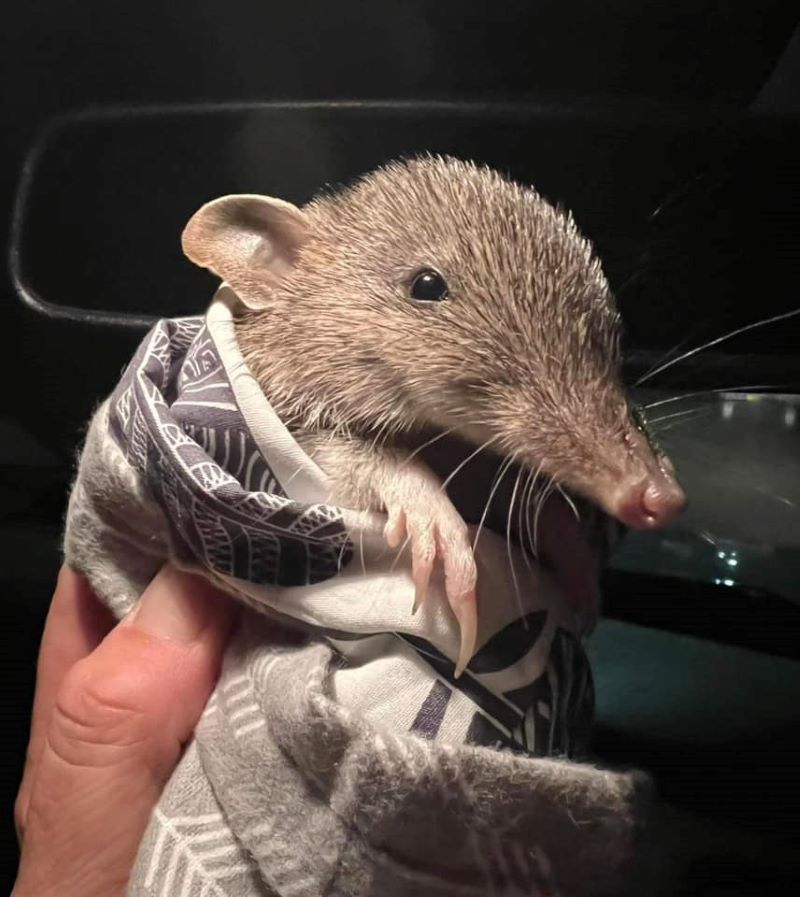
An adult bandicoot rescued by WIRES after a cat attack in lower mountains. Photo courtesy Tracy Burgess
Creating bandicoot friendly gardens
Whether you are someone who wants to encourage your local bandicoots to visit, or want to minimise the impact of the ones who have already decided to start paying you a call, one of the best ways to create a successful co-habitation is by designating part of your garden as a special native space where bandicoots and our other beautiful fauna can find what they need to survive and thrive, without them overly impacting your garden areas.
Giving the bandicoots their own area in your property is easier than it seems, even if you don’t have a traditional bush block.
“We’re truly blessed to be a part of this natural habitat for local wildlife!” – Frances Siddarous, Sun Valley
Bandicoots and native wildlife will be attracted to areas which cater to them, so choose a sheltered and interesting space in your garden to set up as your native space. The Department of Planning and Environment suggests that a space can be made enticing for local wildlife through simple acts such as offering water in shallow drinking vessels, particularly in hotter months for bandicoots and other wildlife to use, as well as planting native flora.
Supply some open grassy areas in the space for bandicoots to happily dig out worms and larvae. Planting native tubers and fungi will ensure bandicoots will accept your generous offer to visit. Removing these delectable treats from other parts of your garden will also quickly educate the bandicoots as to where they are most welcome.
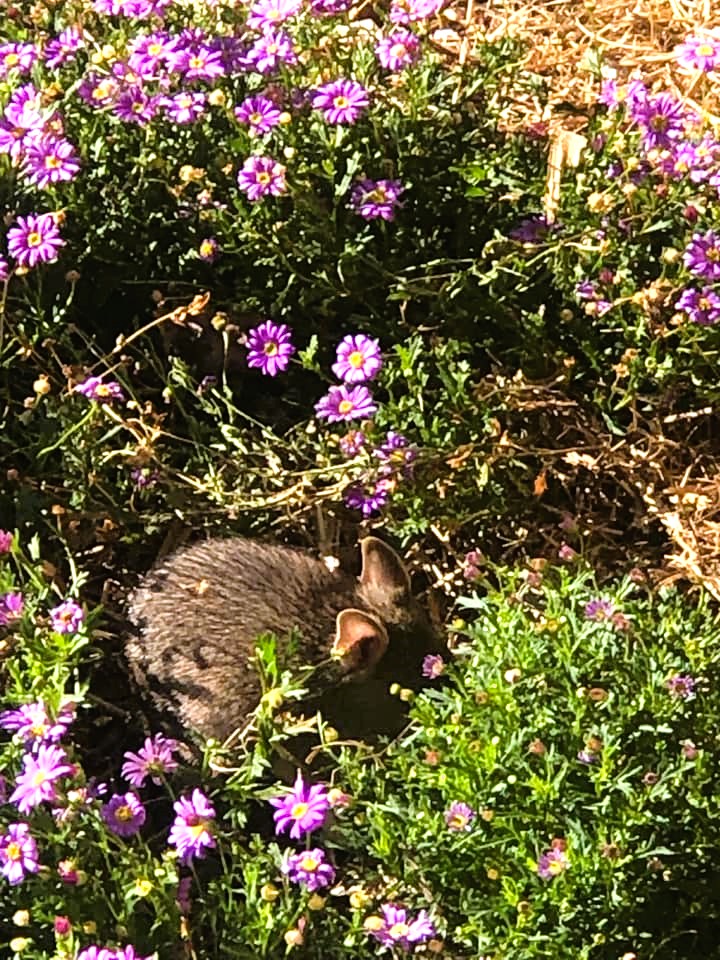
Bandicoot in the blossoms – A long nose bandicoot enjoys sniffing out her favourite food in a native garden bed. Photo courtesy of Bethany Storm, Winmalee resident
Setting up the area as sheltered from harsh light sources as possible will also encourage the animals to remain there, rather than explore the rest of your garden as bandicoots, being mainly nocturnal, dislike harsh lighting and will avoid areas that are flood lit or have too much illumination.
And lastly, try to screen off the area from general use, and from household pets, to ensure your marsupial visitors are not threatened or harmed while you enjoy the rest of your garden.
“We have portioned a section of our garden to attract wildlife … I love supporting Aussie natives.” – Leila Wright, Winmalee
The benefit of having a designated area means that you and the bandicoots can co-exist happily, safely and comfortably as you keep the bandicoots away from areas in your garden which may have been treated with pesticides, strong fertilisers or other hazards to their health.
Using strong wire mesh around plants, garden beds or pet areas you want to keep free from bandicoot exploration will also help ensure the bandicoots only roam where you are happy to have them, and everyone can share the benefits of having these curious critters frolicking in our local neighbourhoods.
Take Action:
- Keep pets inside at night and avoid using pesticides and rat poison outdoors
- Don’t try to relocate unwanted bandicoot visitors – it will return or another will just take its place
- You can create a native-friendly space in your garden to encourage them to go there instead of your flower beds
- Contact WIRES if you find an injured bandicoot
Share this article:
This story has been produced as part of a Bioregional Collaboration for Planetary Health and is supported by the Disaster Risk Reduction Fund (DRRF). The DRRF is jointly funded by the Australian and New South Wales governments.
